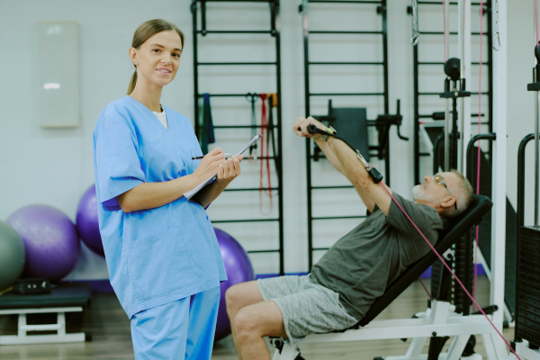Advancing cardiac rehabilitation through research and social prescribing
On this page
Endowment funding case study - research, development and innovation.

Identifying the need
The Highland Heartbeat Centre in Inverness has supported cardiac rehabilitation and research across the Highlands since 2005. While traditional hospital-based rehabilitation programmes have proven benefits, uptake remains low and many patients continue to experience risks following a cardiac event.
COVID further reduced access to centre-based classes, creating a need to rethink how rehabilitation is delivered. Increasingly, there is recognition that community-based activities and social prescribing could play an important role in addressing the wider physical, psychological, and social needs of patients.
A significant legacy donation received by the charity to support the Heartbeat Centre created the opportunity to fund a three-year PhD, ensuring a rigorous and sustained approach to exploring new models of support.
The challenge on the ground
Recovering from a heart problem is about more than just medical treatment. People often face ongoing challenges in staying healthy. Not everyone takes up the offer of cardiac rehabilitation, and many continue to struggle with low activity levels, anxiety, depression, or feelings of isolation.
COVID made things even harder, as many hospital-based programmes were reduced or stopped altogether, and some have not been restarted.
The role of acute services in long term self-management is changing, and the project will assess the potential for community and third sector projects to meet the non-medical needs of this population.
How we responded
Thanks to the generosity of donors, in 2024 the charity enabled the Heartbeat Centre to launch a PhD programme in partnership with the University of the Highlands and Islands, led by Julie Munro.
Julie’s PhD investigates: The role of social prescribing in rehabilitation following a cardiac event. Her work includes:
- identifying unmet needs among cardiac patients
- exploring referral pathways to existing community programmes (e.g. walking groups, Highlife Highland activities, Bravehearts, Men’s Shed)
- co-producing services with patients and partners
- testing the role of cardiac rehabilitation “signposting” to encourage participation
- establishing a Cardiac Advisory Group to involve stakeholders throughout the research
The change we achieved
Although in its early stages, the project is already contributing to service development and collaboration. Initial patient assessments confirm high levels of unmet need and reinforce the importance of a holistic approach to rehabilitation.
Early research by Julie looking at 110 patients has shown the scale of the issue:
- 68% of patients reported low levels of physical activity
- 39% experienced anxiety or depression
- 65% had to access unscheduled care for their cardiac event
These findings show that many people still have unmet needs after a cardiac event, and highlight the importance of finding new ways to support recovery.
The journey ahead
Over the coming years, Julie’s PhD will continue to investigate how community-based programmes can complement clinical care and address the wider needs of patients following a cardiac event.
Plans for a Cardiac Advisory Group are also well underway.
The work has the potential to:
- shape new models of cardiac rehabilitation in the Highlands and beyond
- inform NHS Highland’s approach to social prescribing
- support the development of sustainable community-based rehabilitation groups
By investing in this research, the Highland Heartbeat Centre is helping to pioneer approaches that not only improve patient outcomes but also strengthen collaboration between health services, communities, and the third sector.
